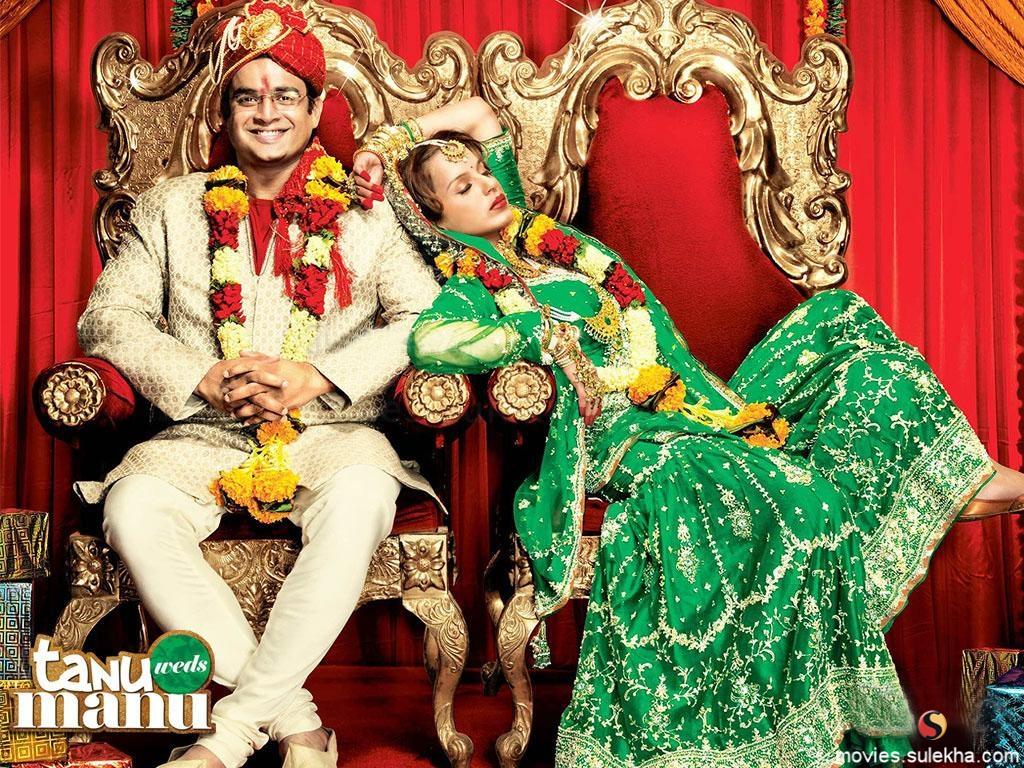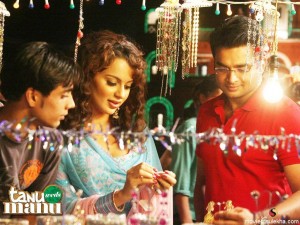Aanand L Rai’s cheeky Tanu Weds Manu begins with the nostalgia evoking voice of Ameen Sayani announcing farmayashi names of the protagonists and the song, ‘Bhor aayi gaya andhiyara’ from Hrishikesh Mukherjee’s Bawarchi. We see a time dappled home in Kanpur that hasn’t been painted in a while, getting ready for a guest while the patriarch sits blissfully lost in the vintage song on the terrace overlooking a string of mohallas and the remains of a torn paper kite.
And instantly, you recall the large aangan of Hrishi Da’s film where a joint family is beginning the day to the sound of music. Chores are unfolding. There is the pile of vessels in a corner, a bustling traditional kitchen, a staircase and as we discover later, a story that could be playing in any middle-class Indian home. Tanu Weds Manu references all this and as we go along, Hindi film songs that range from the poetic, ‘Teri ankhon ke siva duniya mein rakha kya hai’ to what the saucy heroine refers to as ‘tharki’ songs about razai, sardi and chaarpai! There is a nod to Sooraj Barjatya too where an extended family is watching Hum Saath Saath Hain. And ofcourse, to the Chopras and the signature big fat Punjabi wedding and yes, a bit of Imtiaz Ali’s Jab We Met premise too but not literally.
The film in its entirety pays a tribute to films we have grown up loving but not in an obvious way. If Aditya Chopra in DDLJ and Sooraj Barjatya (particularly in Vivah) channelled the Punjabiyat and UP mohallas respectively on painstakingly detailed but obviously fake sets, here Rai writes a visual love letter to mofussil India that smells of peeling plaster, narrow, damp lanes and is overflowing with wistfulness for the rangrez who dyes odhnis in a kadhai, for roadside jalebis and kulfis and junk jewellery kiosks, for loud punjabi songs being played in gaudy public transport vehicles, for terraces with charpoys under summer skies, snatches of shabads wafting into homes at morning, gurudwara weddings, unruly band, baaja, baraats, cramped bazaars and wedding finery stores where brides-to-be pose in ghagras and chunris to find the perfect fit.
Instead of doing a pale version of Mehendi laga ke rakhna, Rai recalls the classic Kajra mohabbat wala and the heroine after quaffing Old Monk (neat!) dances to it and flirts outrageously with the shy boy, she had not wanted to marry!
The guilelessness of parents trying to find a suitable boy for a supposedly wayward daughter who smokes, rebels without a cause, curses and has a casual approach towards love and sex and tattoos on the chest is endearing. As is the familiarity with which the director takes us scampering along the lanes of Lucknow, Kapurthala, Delhi and Kanpur. The attention to detail is soul filling. A mosquito coil under the charpoy on a terrace. A bride-to-be and her friends piling up in a Pajero to go to a beauty parlour. Songs in a train. The Jai Mata Di refrains between scandalous gossip on the Vaishno Devi trail. The warm banter between old friends. The awkwardness of first meetings on the arranged marriage beat. The mixed up mind of a girl who has Che Guevara and Sidney Sheldon in her room and a furry heart toy that squeaks,”I love you.”
Love is not so much about unbridled passion here as about chance meetings, shy eye locks and conversations that flirt with the boundaries of “Sharma ji” and “Tanu ji” as they both spend fleeting moments around a bonfire, in a car, in a bazaar. Kangana Ranaut’s Tanu is a confounding minx in Patiala salwars and short kurtis. She is fun to watch, not so easy to empathise with but is ultimately brave and refreshingly uncouth in the way she sits, moves around, connects with people. This is one film that Kangana needed in her repertoire to show that she can handle a main-stream, romantic caper with verve.
R Madhavan emotes more with silences than with words.
Deepak Boriyal, the absolute marvel from Omkara (where he spent a large amount of screen-time crying over his ‘Doly’) and the stoic young army officer in Shaurya and the goat fostering mithaiwala in Delhi 6 is in crackling form once again. Jimmy Shergill as a gun toting, wise cracking goon is engaging as well. The supporting cast of Navni Parihaar, Rajinder Gupta, KK Raina, Eijaz Khan and especially Swara Bhaskar have their moments. The writing by Himanshu Sharma is full of zest and after a long time, you can hear the dialogue pop and sizzle in a film. Band Baaja Baraat and Tanu Weds Manu rekindle memories of warm and funny, smartly written mainstream entertainers rooted in contexts we can understand and connect with.
Krsna’s springs a surprisingly soulful and vibrant musical score and the film with its basic premise of “I love her, she loves me not” is like a festive mithai box bursting with desi ghee goodies and you want to steal one more laddoo even though you know you are full.
Reema Moudgil is the author of Perfect Eight. (http://www.flipkart.com/perfect-eight-reema-moudgil-book-9380032870) . More on Story Wallahs. Also check other books by Unboxed Writers in our Store.









Am slurrping after the laddoo … HAVE to eat it now! Will go watch the movie tomorrow!
excellent review
It was fun re-reading this review after 2 long years, Reema, esp. because TWM is one of my fav films. And I must have watched it 5-6 times in last 2 years. It’s a ritual to re-visit some films every now and then. TWM is one of them. Was not sure why. But I read your review and get my answers 🙂 Am glad am not the only one who liked it for various reasons. I had been rooting for Raanjhana subconsciously because of the filmmaker, Rahman’s music, Dhanush and Swara Bhaskar! Yet to watch it and waiting for your review now. Please post soon! 🙂